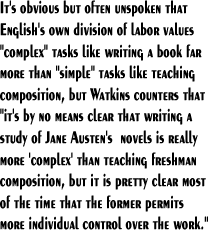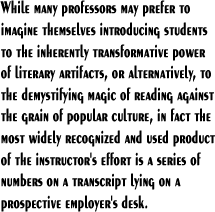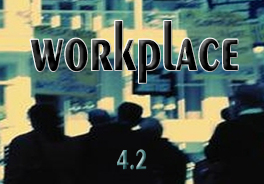Now that it's harder not to think of English departments as workplaces-not just as locations for classrooms and offices and mailboxes and bad coffee, but as sites where a large mobile labor force is rotated through each semester, Evan Watkins' Work Time seems more timely than when it appeared in 1989. But you won't find much about adjunct labor in the book; the labor force Watkins is most interested in (that is, the one that produces the most concrete labor) is not adjunct faculty, but the students themselves. Although sometimes it may be hard for teachers to believe, students' total work-hours devoted to the labor of English (reading, writing, attending class) cumulatively outnumber by a great margin the hours put in by their instructors. Watkins takes up three major questions: first, what kinds of work are English students and their instructors doing, and what does this work produce? Second, why does an economic system that has no obvious social role for the evaluative work of English outside the academy not only tolerate but encourage the growth of English departments and classes? And finally, where does the value produced in these departments circulate, both within and beyond the university? Now that studies on the conditions of adjunct labor have reached the mainstream, this high-level look at the work of English is an important step back to examine the role of English within a capitalist system and the role of professional work in education as a subclass of labor. Watkins sees adjunct labor conditions as a side effect of the social division of labor clashing with an attenuated professional system, and his placement of English within this larger social framework puts issues of social justice in the English workplace in a usefully broad context.
Watkins studies the relationship of student work to the kinds of labor their professors undertake (teaching, attending meetings, writing recommendations, writing for publication), as well as instructors' self-conceptions of the nature and location of their several varieties of work. Taking as a starting point Gramsci's theory of the role of the intellectual class in both reinforcing and challenging hegemonic social structures, Watkins uses extended conceptions of Marx's "concrete" and "abstract" labor, as well as the social division of labor, and applies them to the seemingly unlikely terrain of the English department.
Watkins begins by examining the various uses of "work" in the academic context and their hierarchical relationships: from "scholarly work" to "committee work" to "student work" to seemingly mundane details such as the number of hours credited to one's university paycheck at the end of the week. It's obvious but often unspoken that English's own division of labor values "complex" tasks like writing a book far more than "simple" tasks like teaching composition, but Watkins counters that "it's by no means clear that writing a study of Jane Austen's novels is really more 'complex' than teaching freshman composition, but it is pretty clear most of the time that the former permits more individual control over the work" (138). Watkins' ultimate goals are threefold: to give laborers some degree of control over their own workplaces, to expedite social mobility within society, and to at least partially collapse the social division of labor. Because such aspirations seem a little too ambitious once one actually puts them on the page, Watkins prefers circumlocution rather than direct statements about how to transform work in English and the capitalist workplace in general. The closest he comes to suggesting possibilities for practice is in passages like this: "What is at stake in a praxis of intervention involves how concrete labor practices can be put to the tasks of exerting positional pressures on the way in which English functions to distribute social relationships in and through the production of evaluations" (240).
Although Watkins doesn't concern himself with
the role of adjunct faculty, his global view of English as part of a larger
system of professionalization sheds light on the problem of adjunct laborers
in the university. Professional status in American society is the closest
one can come to a formal title, yet with the explosion of new professional
positions in the 20th century (also anticipated by Gramsci) not all professionals
command the same control over their working conditions, leading to a subclass
of professionals whose work becomes almost indistinguishable from wage
labor. So when adjunct professors express dissatisfaction with salaries
and benefits that compare poorly with those of a convenience store manager,
they are not only arguing for a better quality of life but also protesting
a failed promise of the professional status system in the American division
of labor. Graduate students in the humanities devote years of their life
to the credentialization they hope will underwrite a career in which the
ability to manage one's own time compensates for low pay, and when this
promise is not fulfilled they rightfully feel betrayed by the professional
system.
The book's strengths include many insights into the oddly conflicted nature of English teaching-the difference between the promise and possibility of the world of ideas versus the prosaic world of transcripts and paychecks that serve as the most visible "product" of this peculiar form of labor. And while transcripts circulate the most visible form of evaluation that English produces, other kinds of evaluations are the currency within English departments themselves. English produces evaluations of all types: of texts, of skill and competency (of both peers and of students) and even of the social structure itself, since education also functions as a sorting mechanism to encourage meritocracy in an unequal society. Where and how these evaluations circulate is the scope of the department and the university's influence and also within the power of the instructor to alter and shape. Watkins' argument reaches its apogee in his extensive readings of two diametrically opposed early 20th-century American texts: Alexander Inglis' Principles of Secondary Education (1918) and The 1909 J. Walter Thompson Blue Book on Advertising. Both works are concerned with the process of circulating value, and Inglis anticipates modern educational concerns by locating the grounds for resisting the gods of the market in the timeless, intrinsic values of literary texts. It is an unequal battle, but while advertising has the edge in both resources and relative unity of purpose (at least between client corporations and their ad agencies), English manages to touch virtually everyone who attends a school from junior high onward. What really distinguishes the two, Watkins argues, is that advertising reaches out (broadcasts) to a mass audience, while English has its audience sent to it-to the specific sites of training that are designated for this economically non-productive activity. Watkins argues that the client for English is neither the managerial administration nor, contrary to recent models of the university as a service institution, the students, but rather society at large.
Although the myths that Watkins punctures have lost some of their power in the years since Work Time appeared, the book still usefully corrects some common self-deceptions concerning the labor of the English instructor and its influence on the post-graduation world of its students. While many professors may prefer to imagine themselves introducing students to the inherently transformative power of literary artifacts, or alternatively, to the demystifying magic of reading against the grain of popular culture, in fact the most widely recognized and used product of the instructor's effort is a series of numbers on a transcript lying on a prospective employer's desk. As Watkins points out, "[y]ou don't report to the registrar that Paradise Lost is a revolutionary fusion of contradictory ethical claims, or even that John has a remarkable grasp of English history for a sophomore. You report that 60239 got a 3.8 in Engl 322, which in turn, in a couple of years, is then circulated to the personnel office at Boeing as 60239's prospective employer. There's a chance the workers in the personnel office at Boeing will hear something from 60239 about the fusion of ethical claims in Paradise Lost, but not a very good one. They will, however, hear about the 3.8 in Engl 322, which they can read and exchange against any number of similar 'value terms'" (18). In other words, he argues, what circulates from English departments is not the same as what circulates in English departments, and it is the too-frequent error of English faculty to assume that the two coincide. To treat the evaluations that circulate from English as merely tangential products of the educational process is to misread how the work of English is perceived and used in social structures outside the academy.
English instructors often don't recognize the site-specific nature of a form of work that doesn't exist outside the academy, and assume that the time they have for critical work is available to their students or others beyond the university setting. For Watkins, "[t]he most dangerous assumption of ideologies of the new is that our political responsibility lies in passing on our work skills and knowledge to others to practice as we do" (28). But how can we teach students the skills of workplace survival and resistance if being able to parse a few lines of Keats won't suffice? Cultural studies offers one alternative, but as anyone who has led students in dismantling the semiotic codes of advertising texts can attest, students may be fully aware of how advertising works and capable of explaining it with a penetrating degree of sophistication, yet remain no less susceptible its imperatives. Watkins has little hope for humanism, multiculturalism or any other programmatic compensatory mechanism in the classroom, as all of these are immediately incorporated within the ideology of the social division of labor-even the most virulent racists can ace their multiculturalism core requirement if they know how to play the game. And playing the game convincingly is what leads to the 3.8 in Engl 322 that pops off the transcript at Boeing.
Watkins dismantles the myth of technology's relationship to education in a brief but worthwhile reminder for conservative critics who blame education's shortcomings for unemployment because of increasingly irrelevant courses, declining standards and undisciplined students. Those who believe the humanities are a distraction for students who should be learning C++ instead of French are not looking at the problems of education and vocational training in their long-term historical perspective. Watkins points out that machines have historically never been the friend of the skilled worker in the long run, even though brief anomalous periods seem to suggest otherwise, and that technical training itself is inadequate as a compensatory mechanism for overcoming structural social divisions. The mistake of blame-the-schools arguments is to assume educational and economic interests are aligned, and forgetting that "nonessentials" like the humanities occupy valuable time that keeps students in school and off the unemployment rolls, preventing the potentially disastrous unemployment that would ensue if 18-year olds were to decide to head straight into the workforce rather than occupying another two to four years continuing their education. Structural and economic realities ensure that the humanities will continue to survive, if not for the reasons that many of us would prefer.
Despite his general pessimism, Watkins does retain some hope for how education might transform the existing structure. "Education," he insists, "doesn't simply 'legitimate' and 'reinforce,' it compensates for a problem projected by the very mechanisms of a division of labor"-that is, the need for varying ratios of laborers to perform either "complex" or "simple" tasks. Watkins again invokes Gramsci and argues that since the division of labor "cannot dictate exactly what form that compensation will take," the possibility for radical social action is created at the site of the university-one of the few privileged places in society both determined by the division of labor and able to violate the hierarchies of class and social codes themselves. And Watkins sees this process not only taking place in the unique context of the university, but also continuing its "circulation" in the social world beyond the classroom. Although this may be a truism for humanists, from Watkins' marxist perspective it is actually rather optimistic and runs counter to the social determinism of Foucault, whose work is implicitly invoked although cited only briefly. That's about as optimistic a conclusion as you'll get from someone whose conclusion about the primary value of English is that it provides one of the few social locations in the system of labor "where the incommensurability of work does not enforce an immediate penalty" (264).
The question remains whether the penalty for "incommensurable" work is then assessed after graduation, as it seems to have been for the environmental canvasser who has four more blocks to cover in sub-zero weather. But it's hard to imagine that she would have chosen this job over, say, clerical work, if those intangible ideological lessons from her humanities education had not remained with her after graduation. Even though she's cold, at least she's not being measured for her tasks-per-minute efficiency in typing, filing and answering the phone, and this may be as close to workplace autonomy as she's likely to find at this stage of her life. Whether this qualifies as resistance or as succumbing to a different form of exploitation isn't clear, but Watkins reminds us that the university is just one of many sites in which the contested labor and value of the humanities is at stake.
|
|

|
|

|
|
